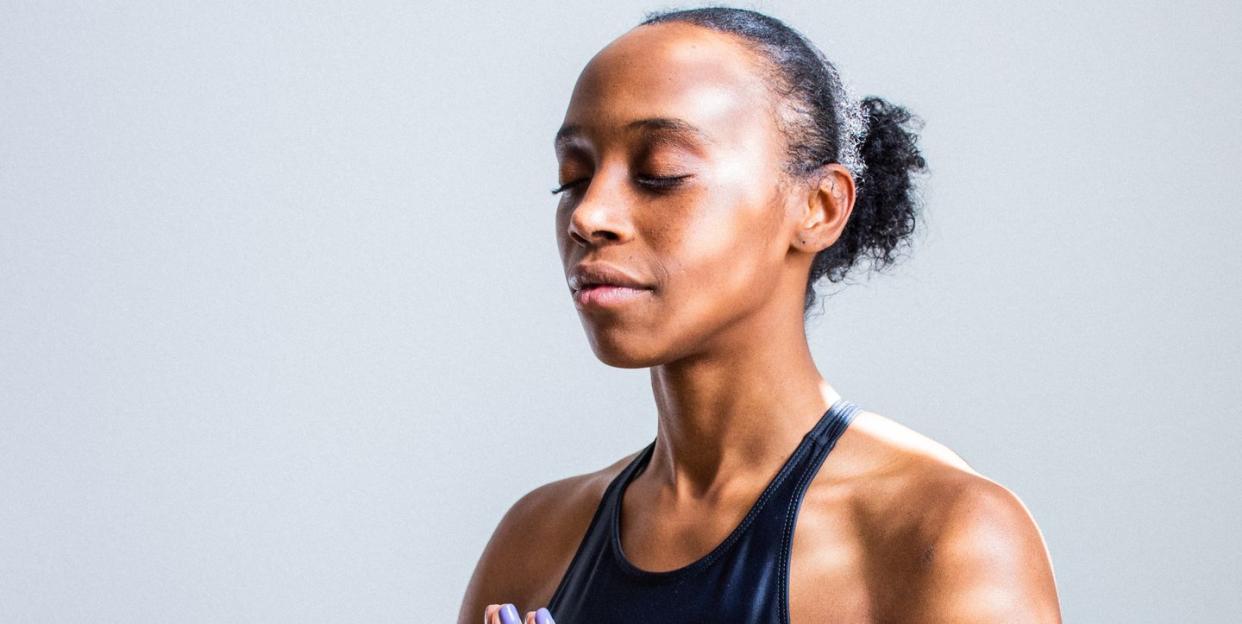Diet and exercise mistakes women over 40 often make

It's no secret that our bodies need different things as we age. In fact, our metabolism starts to slow down after 30 and we can lose up to 5% of our muscle density by 31, but there are lots of small tweaks that we can make to help us feel our best whatever our age.
We spoke to Claire Davis, a celebrity trainer and co-founder of The Midlife Mentors, who revealed the top five diet and exercise mistakes that many women over 40 make – often to try and maintain a healthy weight.
Claire has worked with Melanie Sykes, Amanda Bryam, Ashley Roberts and Madeline Shaw, and specialises in helping women reach optimum health and fitness despite the challenges entering midlife can throw at the body and mind. In short, we couldn't have found anyone better to discuss this with.
Here, Claire shares the 5 common mistakes lots of us make when it comes to diet and exercise in our 40s.
Watch: The truth about gluten
1.Cut ‘food calories’ dangerously low, but drink them instead
'This is a common theme for many midlife women. Their body is no longer playing ball. What they used to do to keep themselves looking and feeling good no longer works. So they drastically cut calories via diet fads, shakes, pills and protocols in the hope it will get results — and fast. The huge issue with this is that our metabolic rate is already slowing down as we age.
'We’re losing muscle mass and we tend to be more sedentary. When we reduce our calories our body will preserve the energy it’s expending, as it doesn’t know when the next energy source is coming. It’s simple evolution.
'I’m not anti-alcohol, but balance is key. If you’re using it for the above then you need to look at your triggers and find healthier ways to manage them. In addition to the negative emotional impact alcohol has on your wellbeing (because it’s a depressant), it is also laden with sugar.

'As we age we become more insulin resistant, meaning we’re unable to process the sugar in our blood as effectively. When you have too much sugar your insulin will spike and then slump you back down — leaving you on a never ending torturous cycle of highs and lows where you’ll crave more and more sugar.
'Excess sugar is linked to holding onto belly fat, depression, lowered immune system and many life threatening diseases. Looking for hidden sugars in food (they’re everywhere) is key, along with reducing alcohol consumption.
'Building a healthy relationship with food is even more important because if you have an unhealthy, undernourished gut, it can lead to all sorts of issues down the line. Education on how, when and what to get for maximum energy and results is what it’s all about.'
2. Eating big, carb heavy meals too late at night
'This is a huge one! Often we see clients’ food diaries and they’re eating high GI carbs such as potatoes, pasta, rice, bread for their evening meal and often late at night.
'This is bad news for a few reasons. Carbs are our primary energy source so they’re good, but they need to be front loaded in the day, so for breakfast and lunch. If you eat them late at night, the energy doesn’t get used up and this is then more likely to get stored as fat.
'Eating really late means you’re in with even less of a chance of using carbs up. And what’s more if you eat late, your body temperature will raise just before bed as it digest the food. This will more than likely disturb your sleep.'
Watch: The keto diet explained
3. Doing cardio but no weights
'This is a huge faux pas for women. The trepidation is mainly due to women being unsure of what to do with resistance equipment (weights), along with a concern that they might bulk up.
'Firstly, endless cardio will never create a new body shape. So if you want to change the way you look then you must do resistance training. Next, if you combine the right cardio with the right weights, you won’t bulk (it’s very hard anyway as you don’t have enough testosterone) but you do need to know what you’re doing.
'Weights will not only help you look good naked, but they’ll help you build lean muscle. Remember: muscle is more metabolically active than fat. So the more muscle you have, the more energy (calories) you’ll burn at rest.
'You’ll also protect yourself from posture issues, injury and potentially the onset of osteoporosis. This is because weight bearing exercise helps maintain our decreasing bone density.'
4.Eating too little protein
Recent studies show the hormone leptin (which signals to your brain that you're full) — decreases as women age. Therefore many women can find they’re hungry more of the time. This will of course mean you eat more calories than you use — creating a calorie surplus and increasing the chances of laying down belly fat.

'Eating more protein is a total game changer for our clients. Try to eat good quality protein — such as turkey, white fish, nuts and seeds. Protein triggers leptin and has been shown to create a significant decrease in the amount of calories consumed over the course of a day and therefore less belly fat.'
5.Misaligning your beliefs and self identity with your goal
'The biggest a-ha moment for our clients is when we get them to become aware of their beliefs around health, fitness, food — even themselves. Because if your beliefs and your actions are incongruent, you will never sustain the results for long. The internal dialogue will always win. Because the truth is you cannot outperform your own self identity.
'So, if you’re always self sabotaging your efforts, it’s a mindset issue, not the process. This is the same for all areas of your life.
'Awareness precedes change. Become aware of what’s holding you back. What’s the voice in your head telling you? What are your patterns of self destruction? When does it happen? And can you locate where the belief originally came from? Once you are aware you can begin to choose new responses to the old triggers. This is how success is created and sustained for life. But it takes effort and consistency…
'We ask clients every morning to reengage with their new beliefs via affirmations. This way you’re able to rewire the brain so your actions and beliefs are aligned.'
Watch: What is intermittent fasting?
You Might Also Like



